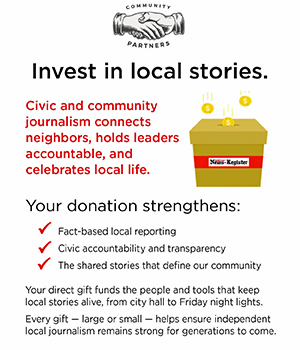Sunshine best disinfectant for insidious government secrecy
When the McMinnville School District refuses to join virtually all other American cities and school districts in disclosing chief executive finalists, how do you have any way to judge the choice its board makes for our next superintendent of schools?
When the McMinnville Police Department begins scanner-proofing its radio transmissions and reducing the breadth, detail and timeliness of the information it provides on its own volition, how do you assess the job it is doing in responding to crime in our community?
When the Yamhill County Health Department resists notifying the public of contagious disease outbreaks at major local places of employment and residency, or provide case numbers even by zip code, how do you assess the threat to our community and the department’s success in countering it?
Public records and meetings laws have been universally enacted across America for a reason — to better enable citizens to play a meaningful role in monitoring the Democratic governmental machinery they themselves have put in place. They should not be exercising their precious right of universal suffrage to elect overseers who respond by shutting off the free flow of public information.
The right of full public access and disclosure has been understood, and to some extent observed, since the founding of our Republic. It is embodied in the Bill of Rights, which the newspaper industry honors annually on the March 16 birthday of its author, James Madison.
It did not begin to take full development, though, until the press succeeded in exposing the sordid underbelly of a corrupt administration, thus forcing the impeachment, disgrace and eventual resignation of Richard Nixon. In response, more extensive, expansive and enforceable public records and meetings laws were enacted in states all across the country in the early 1970s, with Oregon adopting one of the toughest versions anywhere in 1973.
Here’s the problem:
In the intervening half-century, industry and agency lobbyists, knowing you can get away with a lot more in the dark, have slid hundreds of exemptions into nooks and crannies of the state statute books, including Oregon’s ORS. Meanwhile, the general circulation media the public has largely relied on for vital government information has spiraled into a steep and continuing nationwide decline.
Public bodies and officials have been using the vacuum to impose ever greater secrecy, often in the guise of personal privacy, a “right” never mentioned in the U.S. Constitution or its state counterparts. Increasingly, journalists have found themselves butting heads with officials refusing to respond directly to questions, instead falling back on e-mails and press releases they can massage and wordsmith at their leisure.
Print and broadcast professionals are doing their best to battle on your behalf, but they need your help.
You can do your part by supporting your local newspaper with your readership and your subscription and advertising dollars, and by rising to its defense when it comes under attack from special interests seeking unfair advantage. You can also take matters into your own hands by attending public meetings, accessing public records, challenging superficial brushoffs, probing for additional detail and voting for candidates with track records of public openness — not hollow promises.
The formal workings of Oregon’s public meetings and records laws are most often exercised by journalists. However, those laws grant journalists only one narrow privilege not granted to every Oregon citizen — the privilege of sitting in on executive sessions otherwise closed to the public.
The rest of this very detailed and substantial body of law grants the same right of public meeting and record access to every man, woman and child.
Every Oregonian has the same right as The Oregonian to attend a meeting or request a record. No special standing is required.
In an op-ed sharing these pages, former USA Today Editor Ken Paulson admonishes, “We all pay taxes to support the work of government. We should get out money’s worth.”
That’s sage advice as we celebrate Sunshine Week 2021.












Comments